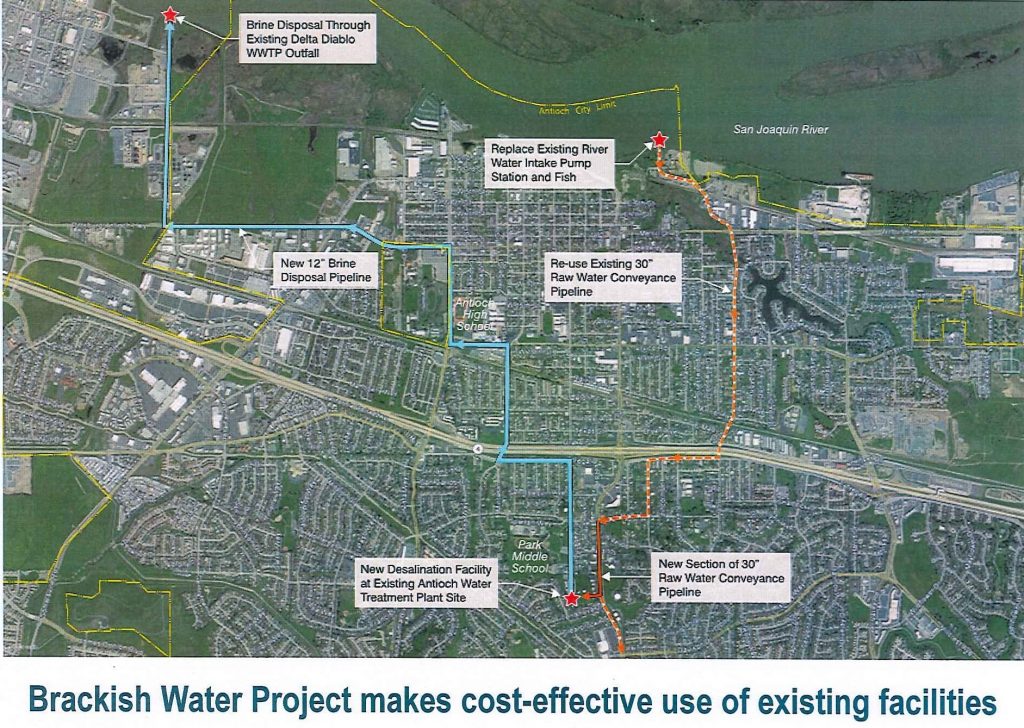State recommends $10 million in water bond funds for Antioch desalination plant

Map of current and proposed pipelines for the Brackish Water Desalination Project in Antioch.
Frazier: Project great example of alternative to disastrous tunnels
The City of Antioch’s plan to build a brackish water desalination plant on the San Joaquin River received a boost from the State Department of Water Resources (DWR), which is recommending a grant of $10 million in Proposition 1 Water Bond funds to the city for construction of the project.
It is one of eight projects on the listed the DWR released in its draft funding awards for the fourth round of Proposition 1 Desalination Grants. The projects are recommended for funding to receive a total of $34.4 million of available funds.
The Antioch City Council unanimously voted to pursue the grant for the $60 million desalination plant at their meeting on December 12, 2017. (See related article.)
“I am pleased to see the hard work we put into passing the Water Bond paying off on a local project that will improve the quality and reliability of fresh water for Antioch residents,” said Assemblymember Jim Frazier, D-Discovery Bay. “This is the type of project we envisioned in the Legislature when we passed the Water Bond legislation and asked voters to approve it.”
Officially titled the Water Quality, Supply and Infrastructure Act and known as Proposition 1 when voters approved it in 2014, the legislation authorized $7.545 billion in general obligation bonds to fund ecosystems and watershed protection and restoration, storage and water supply infrastructure projects and drinking water protection.
“This project creates new fresh water and is a great example of an alternative to the proposed foolhardy Delta tunnels project, which does not create a single drop of new water,” Frazier added. “This plant will use brackish water that is currently not utilized to increase our overall supply of fresh water. This is the type of water project California should be investing in – creating new water with minimal impact on the environment and unambiguous benefit to end users.”
When completed, Antioch’s proposed plant would desalinate up to six million gallons of brackish water per day using a reverse osmosis treatment system. The plant – estimated to cost about $62 million total – would be contained inside the city’s current water treatment facility boundaries on Putnam Street.
Allen Payton contributed this report.



























Frazier can’t take credit for Antioch receiving this grant. DWR was more than happy to award the largest grant to Antioch because they are tired of having to reimburse Antioch when the river water is too brackish and it has to purchase water from CCWD. In the long run this will save DWR some money!
Thank you Arne. Just another fake news item from Frasier. He takes credit for Hiway 4 and ebart too.
Our desalinization plant is here to say. Even though I was opposed to it, with drought constantly in our future and everyone trying to take our water it is a must. And Antioch keeps approving new homes! Idiots.
Not my website but one they should consider using this new technology mesofilter.
State recommends $10 million in water bond funds for Antioch desalination plant | Antioch Herald
[…]There are additionally some who may should undergo special procedures or remedies.[…]
I always wonder why every town or city still allow storm drain water go wasted instead of being captured and used for both nonpotable or potable purposes.. I do not mean the natural creekbeds of sorts but the rainwater that hit the pavement and concrete sidewalk/gutters and down the pipes toward the river like Antioch. Some is released into the bays, sounds, rivers or even creeks all around the world.. I feel that the “paved” stormwater is treatable and useful.. I believe that we can protect the water creatures underwater better by capturing our own “paved” water instead of letting it pour out and pollute . Paved and natural “creek” water are two entirely different quality, in my opinion.. I notice that we are taking better care of our own creekbeds so I believe that water can be let go into the deserving water life without much harm but I dont believe that “paved” water should be allowed to be pouring during the storm weather . Some areas has high annual rainfall and the more reason we need to separate “paved” water from natural creekbed waters..